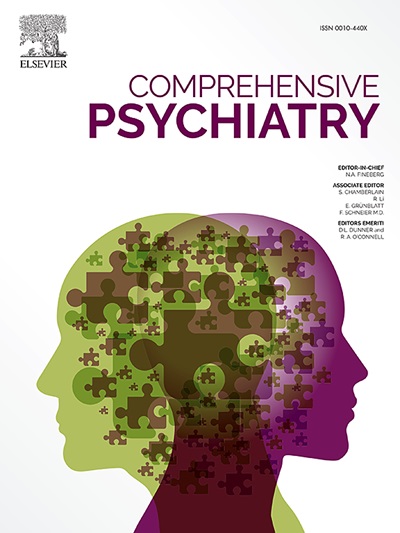The clinical phenomenology of skin-picking disorder – Are there any obsessive-compulsive components?
IF 4.2
2区 医学
Q1 PSYCHIATRY
引用次数: 0
Abstract
Background
Skin-picking disorder (SPD) is currently conceptualized as a condition related to obsessive-compulsive disorder (OCD). The present study investigated whether the emotional, cognitive, and somatic components of skin-picking episodes align with this conceptual framework.
Method
A total of 134 patients diagnosed with SPD (mean age = 32 years; 84 % female; average symptom duration: 16 years) underwent in-person clinical assessment. Patients were asked to describe what they experienced directly before, during, and after picking their skin.
Results
Patients reported a very strong urge to manipulate their skin, particularly in situations characterized by emotional and/or bodily tension. No obsession-like phenomena preceded the skin-picking episodes. Skin manipulation had an immediately rewarding effect in the majority of patients or induced ‘trance-like’ states. After terminating a skin-picking episode, negative self-conscious emotions were dominant.
Conclusions
The interview findings do not align with the conceptualization of SPD as an OCD-related disorder. Patients reported no obsession-like symptoms, and their skin-picking behaviors did not serve harm prevention, which is characteristic of compulsions. Instead, the rewarding nature of skin-picking and its function in experiential avoidance suggests an addiction component to this behavior.
抠皮症的临床现象——是否有强迫症的成分?
背景:抠皮障碍(SPD)目前被认为是一种与强迫症(OCD)相关的疾病。本研究调查了扒皮事件的情感、认知和躯体成分是否与这一概念框架一致。方法:共134例确诊为SPD的患者(平均年龄32岁;女性占84%;平均症状持续时间:16年)进行了亲自临床评估。患者被要求描述他们在采摘皮肤之前、期间和之后的经历。结果:患者报告有非常强烈的冲动去操纵他们的皮肤,特别是在情绪和/或身体紧张的情况下。在扒皮事件之前没有类似强迫症的现象。在大多数患者中,皮肤操作具有立即的奖励效果或诱导“恍惚”状态。在结束抠皮事件后,消极的自我意识情绪占主导地位。结论:访谈结果与SPD作为强迫症相关障碍的概念不一致。患者报告没有类似强迫症的症状,他们抠皮肤的行为也没有起到预防伤害的作用,而这是强迫症的特征。相反,抠皮肤的奖励性质及其在经验回避中的作用表明这种行为有成瘾成分。
本文章由计算机程序翻译,如有差异,请以英文原文为准。
求助全文
约1分钟内获得全文
求助全文
来源期刊

Comprehensive psychiatry
医学-精神病学
CiteScore
12.50
自引率
1.40%
发文量
64
审稿时长
29 days
期刊介绍:
"Comprehensive Psychiatry" is an open access, peer-reviewed journal dedicated to the field of psychiatry and mental health. Its primary mission is to share the latest advancements in knowledge to enhance patient care and deepen the understanding of mental illnesses. The journal is supported by a diverse team of international editors and peer reviewers, ensuring the publication of high-quality research with a strong focus on clinical relevance and the implications for psychopathology.
"Comprehensive Psychiatry" encourages authors to present their research in an accessible manner, facilitating engagement with clinicians, policymakers, and the broader public. By embracing an open access policy, the journal aims to maximize the global impact of its content, making it readily available to a wide audience and fostering scientific collaboration and public awareness beyond the traditional academic community. This approach is designed to promote a more inclusive and informed dialogue on mental health, contributing to the overall progress in the field.
 求助内容:
求助内容: 应助结果提醒方式:
应助结果提醒方式:


